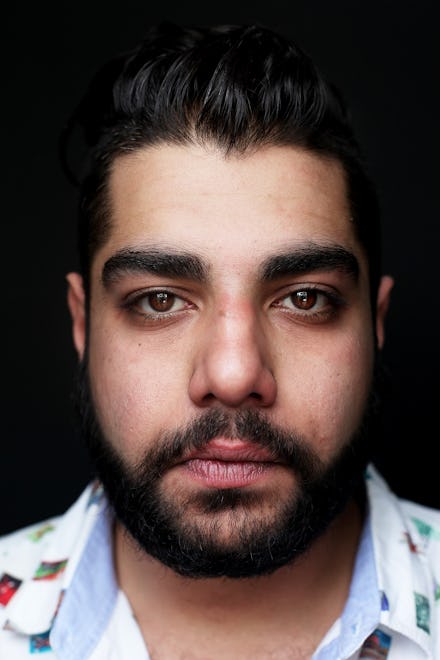Everyone Is Focused on Kendrick, But This Is the Most Exciting New Name in Hip-Hop

Somehow, Heems has been slipping under the radar until now. The story of the 2015 South by Southwest has, as always, focused on indie music. The story of hip-hop in March of 2015 has been roundly focused on Kendrick Lamar's new album. And, as a result, most people are missing one of the most exciting new names in hip-hop: Most people are missing Heems.
But with a brilliant new record and several compelling performances at SXSW, he will soon be known as one of the best and most socially conscious rappers in the game.
Underserved minorities: Heems is increasingly one of the loudest voices representing the underserved South Asian community in America. Though he has been in rap for years as a member of the hip-hop humorist collective Das Racist, his recent solo career is a revelation. Over the course of a couple years, he's dropped two excellent mixtapes and slowly built a name for himself. But his new record, Eat Pray Thug, is his tour de force, tearing down racial myths running rampant in the country and hip-hop itself. He speaks for a community that is too often ignored by hip-hop and the media.
"There's not that many South Asians in media," Heems lamented to Mic. It's especially true of hip-hop. Hip-hop is certainly an art form with a distinct black-white binary — one that Heems has been chipping away at for years — and he believes that Asian artists must speak up about representation. "When I talked about race in Das Racist, it was more commentary on the space between black and white, and how the discourse on race in America has typically been black and white — as the expression goes, and also quite literally. So it was about unity between Victor as a Latino and me as a South Asian, and this idea of brown," Heems explained to NPR.
Lately, that examination is something he's delved into even more. As the conversation on cultural appropriation has heated up recently, Heems' voice is essential because he sees both what is left out of the black-and-white dichotomy and also recognizes exactly where rap came from. Although he's critical of America's ignorance of the Asian experience, he's also very aware of his place and privilege within the rap game.
"I feel like I'm so fortunate that Indian people are even allowed in this country because of the hard work of black people and the civil rights movement. I'm so glad they invented rap music. I'm so glad they let me tag along and I get to rap," he told Mic.
A new perspective: His music does more than just tagging along, though. It broadens the conversation in an absolutely essential way. The album expertly explores "that moment after 9/11 when things felt kind of unsafe for the brown community," as he told NPR. Heems pledges a grim allegiance to the USA over an unforgiving, discordant beat on "Flag Shopping." The song explores xenophobia and Islamophobia, which rings particularly true after the Chapel Hill shootings. Meanwhile, "Patriot Act," his last song, probes even further into the devastating emotional affects of racism — "and from then on they called us all Osama," he repeats, as the song evolves into spoken word. As he said to NPR, "And this always happens when a terrorist attack happens: My Muslim friends feel like they need to speak out and say, 'We don't support terrorism.' Of course they don't. Why would they even have to make that comment?"
Always personal: It's a bold political album, but Heems puts a brave personal face on every issue, going so far as to weave his own struggles with depression into his political commentary. "I want to be open in my art," he said to Mic, and he's hopeful that his frankness could possibly provide support to fans. "Obviously more communities of color need to be more open about mental health and not just brush it under the rug ... if we need help, we should get help."
Although Heems is championing a community that America — and hip-hop — too often overlooks, he's an essential voice for anyone who may have grown up first generation, with immigrant parents, mixed race, or just about anyone who's confused about the demarcation of race and ethnicity in this country. His sincerity is a gift of love to his audience, because of course, sharing one's identity freely is emotionally taxing. "How much do you keep for yourself and how much do you give to your audience," he mused to Mic. Whatever the answer, he's already given us so much.